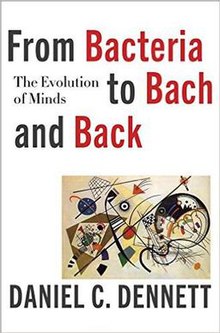
Consciousness, at its simplest, is awareness of internal and external existence. However, its nature has led to millennia of analyses, explanations and debate by philosophers, theologians, and all of science. Opinions differ about what exactly needs to be studied or even considered consciousness. In some explanations, it is synonymous with the mind, and at other times, an aspect of mind. In the past, it was one's "inner life", the world of introspection, of private thought, imagination and volition. Today, it often includes any kind of cognition, experience, feeling or perception. It may be awareness, awareness of awareness, or self-awareness either continuously changing or not. The disparate range of research, notions and speculations raises a curiosity about whether the right questions are being asked.

Daniel Clement Dennett III is an American philosopher, writer, and cognitive scientist whose research centers on the philosophy of mind, philosophy of science, and philosophy of biology, particularly as those fields relate to evolutionary biology and cognitive science.
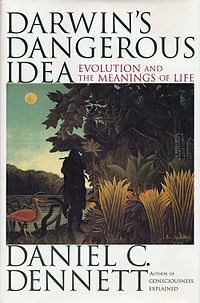
Darwin's Dangerous Idea: Evolution and the Meanings of Life is a 1995 book by the philosopher Daniel Dennett, in which the author looks at some of the repercussions of Darwinian theory. The crux of the argument is that, whether or not Darwin's theories are overturned, there is no going back from the dangerous idea that design might not need a designer. Dennett makes this case on the basis that natural selection is a blind process, which is nevertheless sufficiently powerful to explain the evolution of life. Darwin's discovery was that the generation of life worked algorithmically, that processes behind it work in such a way that given these processes the results that they tend toward must be so.
Epiphenomenalism is a position on the mind–body problem which holds that subjective mental events are completely dependent for their existence on corresponding physical and biochemical events within the human body, yet themselves have no influence over physical events. The appearance that subjective mental states influence physical events is merely an illusion, consciousness being a by-product of physical states of the world. For instance, fear seems to make the heart beat faster, but according to epiphenomenalism the biochemical secretions of the brain and nervous system —not the experience of fear—is what raises the heartbeat. Because mental events are a kind of overflow that cannot cause anything physical, yet have non-physical properties, epiphenomenalism is viewed as a form of property dualism.
Materialism is a form of philosophical monism which holds that matter is the fundamental substance in nature, and that all things, including mental states and consciousness, are results of material interactions of material things. According to philosophical materialism, mind and consciousness are by-products or epiphenomena of material processes, without which they cannot exist. Materialism directly contrasts with idealism, according to which consciousness is the fundamental substance of nature.

Consciousness Explained is a 1991 book by the American philosopher Daniel Dennett, in which the author offers an account of how consciousness arises from interaction of physical and cognitive processes in the brain. Dennett describes consciousness as an account of the various calculations occurring in the brain at close to the same time. He compares consciousness to an academic paper that is being developed or edited in the hands of multiple people at one time, the "multiple drafts" theory of consciousness. In this analogy, "the paper" exists even though there is no single, unified paper. When people report on their inner experiences, Dennett considers their reports to be more like theorizing than like describing. These reports may be informative, he says, but a psychologist is not to take them at face value. Dennett describes several phenomena that show that perception is more limited and less reliable than we perceive it to be.

Freedom Evolves is a 2003 popular science and philosophy book by Daniel C. Dennett. Dennett describes the book as an installment of a lifelong philosophical project, earlier parts of which were The Intentional Stance, Consciousness Explained, and Elbow Room. It attempts to give an account of free will and moral responsibility that is complementary to Dennett's other views on consciousness and personhood.
Eliminative materialism is a materialist position in the philosophy of mind. It is the idea that the majority of mental states in folk psychology do not exist. Some supporters of eliminativism argue that no coherent neural basis will be found for many everyday psychological concepts such as belief or desire, since they are poorly defined. The argument is that psychological concepts of behavior and experience should be judged by how well they reduce to the biological level. Other versions entail the nonexistence of conscious mental states such as pain and visual perceptions.

In philosophy of mind, the hard problem of consciousness is to explain why and how humans and other organisms have qualia, phenomenal consciousness, or subjective experiences. It is contrasted with the "easy problems" of explaining why and how physical systems give a (healthy) human being the ability to discriminate, to integrate information, and to perform behavioral functions such as watching, listening, speaking, and so forth. The easy problems are amenable to functional explanation—that is, explanations that are mechanistic or behavioral—since each physical system can be explained purely by reference to the "structure and dynamics" that underpin the phenomenon.
New mysterianism, or commonly just mysterianism, is a philosophical position proposing that the hard problem of consciousness cannot be resolved by humans. The unresolvable problem is how to explain the existence of qualia. In terms of the various schools of philosophy of mind, mysterianism is a form of nonreductive physicalism. Some "mysterians" state their case uncompromisingly ; others believe merely that consciousness is not within the grasp of present human understanding, but may be comprehensible to future advances of science and technology.
A philosophical zombie is a being in a thought experiment in philosophy of mind that is physically identical to a normal person but does not have conscious experience.
Daniel Dennett's multiple drafts model of consciousness is a physicalist theory of consciousness based upon cognitivism, which views the mind in terms of information processing. The theory is described in depth in his book, Consciousness Explained, published in 1991. As the title states, the book proposes a high-level explanation of consciousness which is consistent with support for the possibility of strong AI.
In the philosophy of mind, the user illusion is a metaphor for a proposed description of consciousness that argues that conscious experience does not directly expose objective reality, but instead provides a simplified version of reality that allows humans to make decisions and act in their environment, akin to a computer desktop. According to this picture, our experience of the world is not immediate, as all sensation requires processing time. It follows that our conscious experience is less a perfect reflection of what is occurring, and more a simulation produced subconsciously by the brain. Therefore, there may be phenomena that exist beyond our peripheries, beyond what consciousness could create to isolate or reduce them.
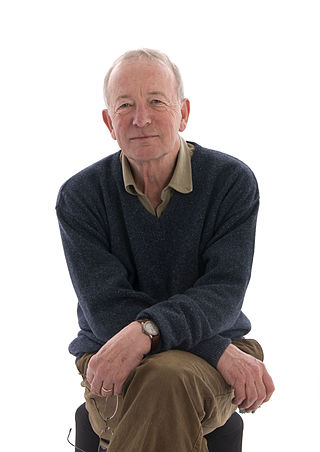
Nicholas Keynes Humphrey is an English neuropsychologist based in Cambridge, known for his work on evolution of primate intelligence and consciousness. He studied mountain gorillas with Dian Fossey in Rwanda; he was the first to demonstrate the existence of "blindsight" after brain damage in monkeys; he proposed the theory of the "social function of intellect". He is the only scientist to have edited the literary journal Granta.
The intentional stance is a term coined by philosopher Daniel Dennett for the level of abstraction in which we view the behavior of an entity in terms of mental properties. It is part of a theory of mental content proposed by Dennett, which provides the underpinnings of his later works on free will, consciousness, folk psychology, and evolution.
Here is how it works: first you decide to treat the object whose behavior is to be predicted as a rational agent; then you figure out what beliefs that agent ought to have, given its place in the world and its purpose. Then you figure out what desires it ought to have, on the same considerations, and finally you predict that this rational agent will act to further its goals in the light of its beliefs. A little practical reasoning from the chosen set of beliefs and desires will in most instances yield a decision about what the agent ought to do; that is what you predict the agent will do.
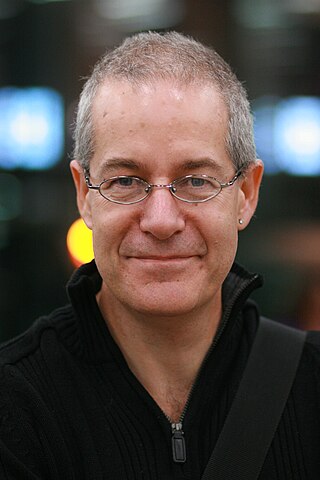
Massimo Pigliucci is an Italian-American philosopher and biologist who is professor of philosophy at the City College of New York, former co-host of the Rationally Speaking Podcast, and former editor in chief for the online magazine Scientia Salon. He is a critic of pseudoscience and creationism, and an advocate for secularism and science education.
Bicameral mentality is a hypothesis introduced by Julian Jaynes who argued human ancestors as late as the ancient Greeks did not consider emotions and desires as stemming from their own minds but as the consequences of actions of gods external to themselves. The theory posits that the human mind once operated in a state in which cognitive functions were divided between one part of the brain which appears to be "speaking", and a second part which listens and obeys—a bicameral mind, and that the breakdown of this division gave rise to consciousness in humans. The term was coined by Jaynes, who presented the idea in his 1976 book The Origin of Consciousness in the Breakdown of the Bicameral Mind wherein he made the case that a bicameral mentality was the normal and ubiquitous state of the human mind as recently as 3,000 years ago, near the end of the Mediterranean bronze age.

In philosophy of mind, qualia are defined as instances of subjective, conscious experience. The term qualia derives from the Latin neuter plural form (qualia) of the Latin adjective quālis meaning "of what sort" or "of what kind" in relation to a specific instance, such as "what it is like to taste a specific apple — this particular apple now".
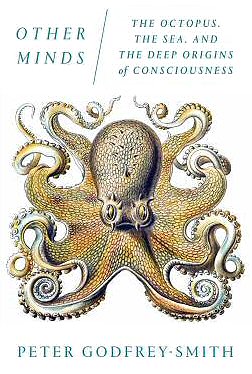
Other Minds is a 2016 bestseller by Peter Godfrey-Smith on the evolution and nature of consciousness. It compares the situation in cephalopods, especially octopuses and cuttlefish, with that in mammals and birds. Complex active bodies that enable and perhaps require a measure of intelligence have evolved three times, in arthropods, cephalopods, and vertebrates. The book reflects on the nature of cephalopod intelligence in particular, constrained by their short lifespan, and embodied in large part in their partly autonomous arms which contain more nerve cells than their brains.
Keith Frankish is a British philosopher specializing in philosophy of mind, philosophy of psychology, and philosophy of cognitive science. He is an Honorary Reader at the University of Sheffield, UK, Visiting Research Fellow with The Open University, and adjunct Professor with the Brain and Mind Programme at the University of Crete. He is known for his "illusionist" stance in the theory of consciousness. He holds that the conscious mind is a virtual system, a trick of the biological mind. In other words, phenomenality is an introspective illusion. This position is in opposition to dualist theories, reductive realist theories, and panpsychism.
